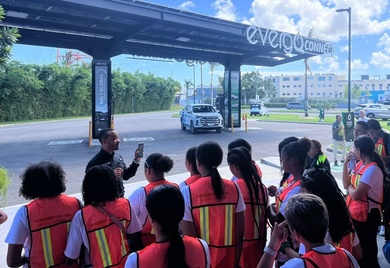Energy Efficiency Means Investment Opportunities for Technological Companies

The telecommunications and digital technologies sector has a great opportunity to contribute to sectors such as energy, transportation, and industry in two ways: through digitization and efficiency.
This dual opportunity positions digital connectivity as an essential tool for advancing efficiency and security in energy supply, both in Latin America and the Caribbean and worldwide.
But for this potential to materialize, it is urgent that sector players identify opportunities to digitalize high-impact existing applications, with a long-term vision and a commitment to resilience.
The effects of weather phenomena such as storms, floods, and heat waves influence public policy planning, investor expectations, and consumer decisions.
Efficient and Profitable
In this context, inaction can quickly translate into higher costs for consumers and private companies (due to increased operational costs, less competitive value chains, or the realization of physical climate risk), stricter regulations, and loss of competitiveness.
Recommended Reading
On the other hand, companies that prioritize sustainability and operational efficiency can significantly improve their profitability.
Recent studies show that investing in sustainable networks and energy-efficient cloud solutions can increase earnings before interest, taxes, depreciation, and amortization (EBITDA) by 5% to 15%.
All this thanks to:
- Improved brand perception
- Attraction of responsible investors
- Generation of new revenue from sustainable products or services
Digital Leaders
This is about anticipating environmental risks and making smart business decisions that position companies as leaders in a new digital economy with energy efficiency.
Latin American operators face particular challenges in moving toward a smart connectivity model.
Among the most relevant are:
- Reducing energy consumption: Mobile and broadband networks remain highly energy-intensive. Adopting energy-saving technologies and network optimization will be key.
- Diversifying energy sources: Transitioning to alternative energy sources to power data centers, base stations, and operations is an unavoidable priority.
- Resilient infrastructure: With extreme weather events on the rise—such as hurricanes, floods, and heatwaves—strengthening digital infrastructure to ensure operational continuity is more urgent than ever.
Multisectoral Strategies
Additionally, the region has a unique opportunity to leverage digitalization's exponential growth to drive multisectoral strategies.
Digitalization enables solutions to:
- Improve energy efficiency in transportation (smart mobility and the use of transport apps or shared bicycles, among others)
- Optimize the electricity sector (smart grids)
- Transform agriculture (precision technologies and weather monitoring)
The path toward more resilient networks requires coordinated efforts among governments, operators, multilateral organizations, and investors.
This new paradigm includes:
- Measurement and transparency: Establishing clear metrics aligned with international standards to report the environmental impact of the telecommunications sector.
- Purpose-driven technological innovation: Promoting the development of solutions that integrate artificial intelligence, big data, and cloud computing to optimize resource use and minimize impacts.
- Environmentally focused investment: Channeling capital into projects that prioritize energy efficiency, renewable energy, and adaptation to more intense weather phenomena.
- Education and training: Strengthening companies’ internal capacities to integrate sustainability into their business and operational strategies.
Profitable and Strategic
At IDB Invest, we recognize that digitalization and sustainability are not parallel paths but converging ones.
That’s why we support companies in the digital and infrastructure sectors with financial solutions and technical advice to integrate environmental, social, and governance criteria into their operations.
Collaborating with our regional partners and clients to realize the links between the environment and digitalization in investments is a key step in this direction.
Building a resilient and sustainable digital ecosystem in Latin America is not only possible: it is urgent, profitable, and strategic.
The region has the talent, demand, and resources to lead this transformation.
LIKE WHAT YOU JUST READ?
Subscribe to our mailing list to stay informed on the latest IDB Invest news, blog posts, upcoming events, and to learn more about specific areas of interest.
Subscribe



